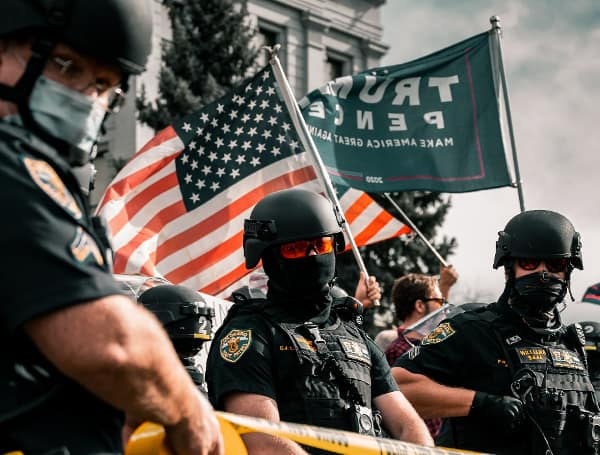
A majority of Supreme Court justices appeared skeptical Tuesday of the government’s broad reading of a statute used to charge hundreds of Jan. 6 defendants, as well as former President Donald trump.
The defendant in the case, Fischer v. United States, argued that the statute he was charged under, Section 1512(c)(2), was expanded beyond its intended purpose of targeting crimes of evidence tampering. Multiple conservative justices pressed Solicitor General Elizabeth Prelogar on whether the government’s interpretation of the statute, which enabled it to charge Joseph Fischer and others for obstructing Congress’ certification of the 2020 election, would sweep in a range of other protest activities.
“Would a sit in that disrupts a trial or access to a federal courthouse qualify?” Justice Neil Gorsuch asked. “Would a heckler in today’s audience qualify or at the State of the Union address?”
Read: Communism History, School Chaplains, AI Bills Teed Up For Florida Gov. DeSantis
The statue threatens to levy up to 20 years in prison against anyone who corruptly “obstructs, influences, or impedes any official proceeding.”
The Supreme Court’s decision could impact not only hundreds of Jan. 6 defendants, but also Trump’s election interference case. Two of the charges in Special Counsel Jack Smith’s indictment of Trump center on the statute.
Smith’s indictment argued that Trump employed “knowingly false claims of election fraud to obstruct the federal government function by which those results are collected, counted, and certified.”
Multiple Jan. 6 defendants charged under Section 1512(c)(2) have already been granted early release in light of the Supreme Court taking up the case, including Kevin Seefried, Alexander Sheppard and Thomas B. Adams Jr., according to The Washington Post.
Gorsuch asked whether pulling a fire alarm before a vote would also qualify for 20 years in prison under the statute, a likely reference to Democratic New York Rep. Jamaal Bowman’s September decision to pull a fire alarm before a House vote on a GOP funding package to prevent a government shutdown.
Bowman pleaded guilty to a misdemeanor violation of D.C. code related to the offense in October.
Read: Florida Rep. Moskowitz, Tennessee Rep. Green File Bill To Sanction Houthi Terrorists
Prelogar said “multiple elements of the statute” might not be satisfied by Gorsuch’s scenarios, noting the government would need to prove the defendant acted corruptly and with the intent of obstructing the proceeding.
Justice Samuel Alito similarly questioned whether the statute could be used to charge someone in the courtroom who shouted during oral arguments, delaying the proceeding by five minutes.
“We don’t think that 1512(c)2) two picks up minimal, de minimis minor interferences,” Prelogar said.
Of nearly 1,387 Jan. 6 defendants, over 353 have been charged with “corruptly obstructing, influencing, or impeding an official proceeding,” according to the DOJ.
Justice Clarence Thomas asked when the government has applied the statute to other protests in the past.
Preloager said the DOJ has not limited the statute’s use solely to crimes of evidence impairment, but noted she is not aware of a similar circumstance “ever happening prior to Jan. 6.”
Justice Amy Coney Barrett seemed amenable to a more middle-of-the-road solution. Barrett questioned whether the statute could be used to charge defendants for trying to “obstruct the arrival of the certificates arriving to the Vice President’s desk for counting,” noting they would still be interfering with evidence in that hypothetical.
Read: Andy McCarthy Says Trump Lawyers Should Seek To Allow Jury To Convict On Misdemeanor
Justice Ketanji Brown Jackson likewise suggested the government may still be able to charge defendants if they limited the statute in this manner, clarifying that it applies to conduct that would obstruct an official proceeding “insofar as it is directed to preventing access to information or documents or records or things that the official proceeding will use.”
Justice Sonia Sotomayor and Elena Kagan appeared more sympathetic to the government’s position. Kagan noted there has never “been a situation like this with people attempting to stop a proceeding violently.”
“So I’m not sure what a lack of history proves,” she said.
First published by the Daily Caller News Foundation.
Help support the Tampa Free Press by making any small donation by clicking here.
Android Users, Click To Download The Tampa Free Press App And Never Miss A Story. Follow Us On Facebook and Twitter. Sign up for our free newsletter.

